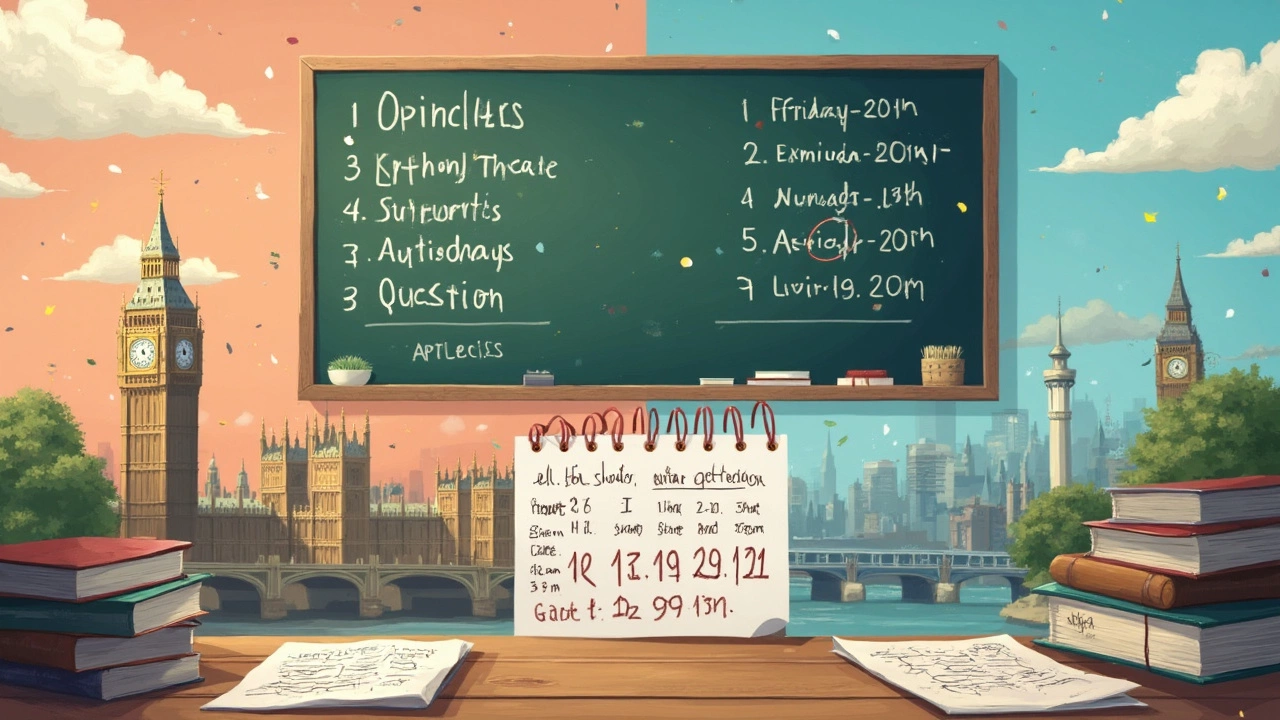-
12
- 0

A-levels in England: How They Really Work
If you've ever heard British teens stress about exams, it's probably A-levels they're talking about. These aren't just some random school tests—they're a big deal for anyone finishing school in England and thinking about what comes next.
So, what exactly are A-levels? In simple terms, they’re qualifications students usually take between ages 16 and 18, right after GCSEs. Think of A-levels as sort of a ‘choose your own adventure’ in education. You pick three or sometimes four subjects you want to dive deeper into. Whether it’s maths, biology, or even psychology, there’s a lot of freedom. And yes, the choices you make now seriously shape your future—like which universities you can apply to or what careers you might end up in.
- A-level Basics
- Choosing Subjects
- How A-levels are Assessed
- Timeline and Key Points
- A-levels and University Choices
A-level Basics
Let’s get the basics straight: A-levels stand for “Advanced Level” and they’re the main qualifications for students in England who finish GCSEs (usually at age 16) and move on to what’s called “sixth form” or college. Most teenagers pick three subjects, though super keen students might do four, especially if they’re aiming high or just love a challenge. Subjects range from maths, physics, and history to things like media studies or foreign languages.
The whole thing takes two years. In the first year, it’s often called Year 12 or “lower sixth,” and the second year is Year 13 or “upper sixth.” Most schools used to have something called AS-levels at the end of the first year, but now, in most cases, students keep going and all the big exams are at the end of the second year.
Why are A-levels such a big deal? They’re the main way universities in the UK decide if a student gets in. Most offers from universities are based strictly on specific A-level grades. Miss those grades, and you might have to completely rethink your plans.
Here are a few more key facts to know:
- You don’t have to stick with the stuff you did best at GCSE. For example, it’s totally normal to try a new subject like psychology or law.
- Some subjects have coursework (like English or art), while others are all about the final big exams (maths, for example).
- Most students take A-levels at regular schools, sixth form colleges, or sometimes even online if life gets in the way.
A-levels might sound intense, but they’re designed to let you specialize in subjects that really matter for your future. Knowing this from the start can really help you plan your next steps.
Choosing Subjects
This is where things start to feel real. Picking your A-level subjects isn’t just about your favourite classes—it’s actually one of the most strategic choices you’ll make in school. Here’s the deal: most students pick three subjects, though some try for four if they’re super motivated or want to keep options extra open. You can only drop down to two A-levels in rare cases, but universities usually want to see three full A-levels when you apply.
Your choices can seriously impact what you do next. Some degrees require specific A-levels. For example, if you dream of becoming a doctor, you absolutely need biology and usually chemistry. Going for engineering? Maths is a must, and physics is also super helpful. Even for something like English literature at uni, you’ll almost always need an A-level in English lit. So, before picking, check out the entry requirements for any careers or university courses you’re interested in—even if they seem a long way off.
Bigger sixth forms and colleges offer a massive range, from classics like maths and history to less common ones like film studies or sociology. Don’t feel pressured to just pick what your friends choose. And steer clear of randomly choosing a subject just because someone says it’s “easy”—what’s easy for one person might make someone else miserable.
- Look up university course requirements for ideas. The UCAS website lists what subjects are essential for all sorts of degrees.
- Think hard about what you enjoy and where you get your best grades. You’ll do these subjects for two whole years—it’s hard to stick with something you hate.
- Talk to teachers, older students, or a careers adviser. They can give real talk on workload and how each subject actually feels at A-level.
- Some universities have a list of “facilitating subjects” (like maths, physics, biology, chemistry, English, history, geography, and languages) they especially value. Picking one or two of these can keep more doors open.
Finally, don’t forget that the jump from GCSE to A-level is pretty big. Subjects you breezed through at GCSE will get trickier. Still, if you pick the right ones for you, and have a solid reason—whether that’s a career goal or genuine interest—you’ll set yourself up well for what’s ahead with A-levels.

How A-levels are Assessed
This is where things get real—how do exam boards actually decide your grades? Nearly all A-levels are assessed by written exams at the end of your two-year course. These aren’t spread out; everything rides on a set of big exams in May and June of your final year. That means students spend months preparing, because there’s not much room for second chances.
Depending on the subject, you might also have coursework (sometimes called non-exam assessment or NEA). For example, in English Literature or History, you’ll write essays or tackle projects that count toward your final mark. Science subjects sometimes have practical assessments done in the lab, but usually, the score from these doesn’t affect your main grade—they just get a ‘pass’ or ‘fail’ tag on your certificate.
Here’s the basic process for marking:
- Exams are written and sent off to exam boards like AQA, Edexcel, or OCR.
- Trained examiners mark the papers using strict mark schemes.
- Marks from exams (and any coursework) get added up to determine a grade.
A-levels use a grading scale from A* (top score) down to E (lowest passing grade). If a student scores below an E, that's a U—ungraded and not a pass. Grades are based on raw marks, but they’re standardized each year so things are fair, even if one year’s exam is a bit tougher than another’s. If a question was much harder than expected, for example, the grade boundaries might be shifted so that students aren’t punished for it.
One thing students sometimes forget—your teachers can often predict your grade pretty accurately because they see your work throughout the two years. But only the actual exam and formal assessments set your final result.
Timeline and Key Points
Alright, let’s map out how the whole A-levels journey fits together. Everything kicks off after GCSEs, usually when you’re 16. Here’s what the usual timeline looks like for most students:
- September, Year 12: You start your A-level courses, picking three—sometimes four—subjects.
- October to December, Year 12: You get used to your subjects and get a taste of what’s ahead through classwork, coursework, or mock exams.
- May or June, Year 12: Some schools still hold AS-level exams at the end of year 12, though they don't always count toward the final grade anymore. It’s a good way to check your progress, though.
- September, Year 13: Year two begins. By now you’ve usually whittled it down to your strongest three subjects if you started with four.
- October to January, Year 13: If you want to go to university, you’ll probably be filling out your UCAS application during this time, with predicted grades playing a huge part.
- May to June, Year 13: The big final A-level exams take place. Revision gets real intense for most students right about now.
- August, Year 13: Results day! Your grades land (usually on a Thursday in mid-August), and you find out if you got into your chosen university or apprenticeship.
Key dates for 2024-2025 that everyone’s watching:
| Event | Typical Timing |
|---|---|
| Course Selection | Spring/Summer 2024 |
| Start of Year 12 | September 2024 |
| UCAS Submission Deadline | Late January 2025 |
| Final Exams | May-June 2025 |
| Results Day | Mid-August 2025 |
One important thing: you can’t just wing it and hope for the best. Schools expect you to keep up with deadlines, coursework (if your subject has it), mock exams, and lots of revision. Messing up early means you might get predicted grades that close off certain university or job options, so it pays to stay switched on at every stage.
Another tip—once you reach the end of Year 12, talk to your teachers about predicted grades and get honest feedback. These predicted grades are what universities look at when deciding whether to give you an offer. So, don’t wait until the last minute to get help or tweak your study habits if things aren’t going to plan.

A-levels and University Choices
Your A-levels aren’t just about getting through sixth form—they pretty much decide what doors open next, especially if you’re thinking about university. Every UK university sets entry requirements for its courses, and those requirements are built around your A-level subjects and grades.
If you’ve got your heart set on medicine, for example, most unis absolutely need you to have A-levels in Biology and Chemistry. Want to study Law? There’s usually no strict subject list, but going for essay-based subjects like English or History helps. The same logic works for engineering (expect to need Maths and maybe Physics) and loads of other degrees.
Here’s how it usually lines up:
- Universities typically ask for three A-levels, but a handful of super-competitive courses might want four.
- Offers are mostly conditional, like "ABB" or "AAB", which means you’re expected to land those grades or higher.
- "Facilitating subjects"—like Maths, English, Sciences, or a language—still get you extra points for loads of courses.
To make it clearer, check out this table of a few popular courses and the classic A-level requirements:
| Course | Common A-level Subjects Needed | Typical Offer |
|---|---|---|
| Medicine | Biology, Chemistry | AAA or higher |
| Engineering | Maths, Physics (sometimes Chemistry) | AAB–AAA |
| Law | Any (English/History recommended) | AAB–AAA |
| Psychology | One science (Biology helps) | ABB–AAB |
| English Lit | English Literature | ABB–AAA |
Remember, it’s not just about picking the easiest subjects—universities really do look for solid combinations. If you want the best shot, always check the entry requirements at places you might apply to, even if you’re still not totally sure what course you’ll take later. A lot of schools push students to keep at least one A-level ‘facilitating subject’ in their mix because it keeps more degree options open.
One more tip: Unis also care about predicted grades from your teachers, which are sent in with your UCAS application. If your actual results are lower than your offer, you might have to try for a spot in Clearing. So, it’s smart to stay on top of revision and ask for feedback along the way—the university process moves fast and you don’t want to miss your chance because of a mix-up or late decision.
Write a comment
Tags Weight
- education
- exam preparation
- study tips
- adult education
- online courses
- adult learning
- lifelong learning
- distance learning
- GCSE revision
- online education
- private tutoring
- special needs education
- scholarships
- remote learning
- scholarship tips
- financial aid
- international students
- effective learning
- e-learning
- education funding

Written by Elara Winslow
View all posts by: Elara Winslow